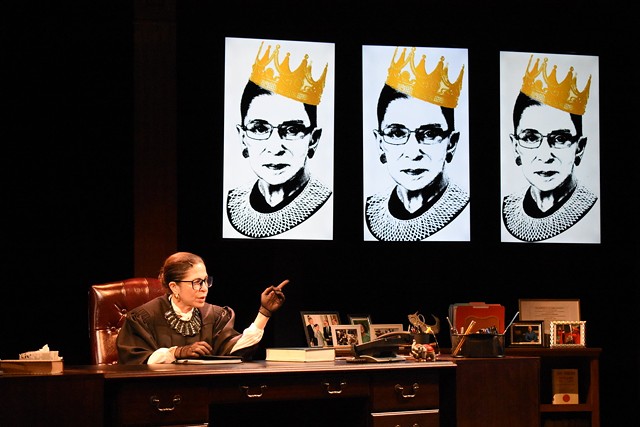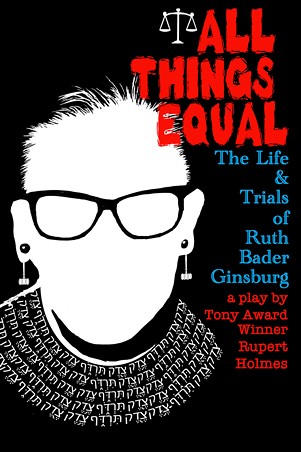
- Courtesy
- Michelle Azar in All Things Equal: The Life & Trials of Ruth Bader Ginsburg
Theater asks audience members to suspend disbelief and, for the duration of a show, allow themselves to be transported to another place and time. People watching Michelle Azar in the one-woman show All Things Equal: The Life & Trials of Ruth Bader Ginsburg go willingly, according to playwright Rupert Holmes.
“They just accept that this is Ruth Bader Ginsburg,” he said, referring to the late justice of the U.S. Supreme Court. “And they become chummy with her within minutes. They embrace her; they celebrate with her; they cry with her.”
Even after the curtain falls, some continue to believe that Azar is Ginsburg. At postshow question-and-answer sessions, Holmes said, he has heard audience members ask Azar questions that only Ginsburg could answer. They stumble over themselves, saying “you” when they mean “Ruth.”
All Things Equal, directed by Laley Lippard and on its second national tour, comes to the Flynn Main Stage in Burlington on Friday, March 8.
Holmes framed the 90-minute show as Ginsburg talking to a friend of her granddaughter's whom she has invited to her Supreme Court chambers. Ginsburg was the class valedictorian who missed graduation at her Brooklyn high school because her mother died of cancer the day before. She was one of nine women in her class of 552 at Harvard Law School, juggling classes, studies and motherhood while caring for her husband, who was sick with cancer.
After she graduated — from Columbia Law School, tying for first in her class — no one would hire her as an attorney, Holmes noted: “She had three strikes against her, she said: She was woman, she was Jewish, and she was a mother.”
Ginsburg became a clerk for a federal district judge. She wrote a well-regarded treatise on Swedish civil law, taught at Rutgers’ and Columbia’s law schools, and became the first woman to receive tenure at the latter. While there, she also became the first director of the American Civil Liberties Union’s Women’s Rights Project. In that role, she patiently and methodically worked to persuade the Supreme Court that sex discrimination violated the 14th Amendment’s guarantee of equal protection. Before joining the Supreme Court in 1993, she won five of the six cases she presented there.
By the time she died, on September 18, 2020, at age 87, she had become a feminist icon and diminutive hero hailed as a rock star.

- Courtesy of Barry Gordon/Theaterlife.com
- From left: Laley Lippard, Michelle Azar and Rupert Holmes
Holmes, who lives in Cold Spring, N.Y., has amassed many theater credits, as well. He was the sole creator of the musical comedy The Mystery of Edwin Drood, which won five Tony awards in 1986, including Best Musical, Best Book and Best Score. He wrote the Tony-nominated play Say Goodnight, Gracie, about comedian George Burns. With musical director Joseph Joubert, he has written a new adaptation of Gilbert and Sullivan’s The Pirates of Penzance, set in New Orleans and scheduled to open on Broadway next year.
Holmes chose to write about Ginsburg, he told Seven Days, because he admired her and because of the parallels he saw between her life and that of his wife, who lost both of her parents while she was in high school. Liza Holmes also studied law while raising a daughter and attended Rutgers Law School, though not while Ginsburg was there. The idea to write the play arose from a conversation Holmes had with theater producer Scott Stander shortly after Ginsburg died.
At the time, many theaters remained closed due to the COVID-19 pandemic. Stander was spacing audience members eight seats apart and staging Holmes’ one-actor play Say Goodnight, Gracie, Holmes recalled. “We talked about the fact that maybe, for a while, this is the only kind of play we can do. And he said, ‘What would you think about doing a play about Ruth Bader Ginsburg?’”
In her later years, Ginsburg became widely known as “the Notorious RBG,” a play on the Notorious B.I.G., a rapper who, like the justice, hailed from Brooklyn.
“I felt that there was a risk of her becoming a meme,” Holmes said. Biographies, a documentary, children’s Halloween costumes, key chains, coasters and bumper stickers that said “You Can’t Spell Truth Without Ruth” had made Ginsburg widely known. She had been parodied on "Saturday Night Live." But she had lived “a remarkable, rich life,” Holmes said. “And the idea that she's just this symbol of an old lady being tough bothered me.”
He began a year of research. While a one-actor show may have been the only practical choice at the time, “I happened to love the one-actor format,” he said. Done right, the character has a reason to talk to the audience and audience members know why they are there, he said: “You are not just an audience; you are having an audience with this character.”
The show uses recorded voices, sound effects, projections and music — including selections from operas Ginsburg was known to attend — to take viewers to her home and various courtrooms as scenes in her life play out.
They go to the Supreme Court with Ginsburg as she argues her first case. “You realize how small she is at this big lectern,” Holmes said. The justices are all men, he added, “and you can feel the weight of their stare and their condescension.”
Despite such serious scenes, there is comedy, too. “It's a funny play, believe it or not," Holmes said, "only because she was a witty woman, and a lot of ironic, a lot of droll things happened.”

- Courtesy
Audiences may recognize Azar from Shonda Rhimes’ ABC TV series “How to Get Away With Murder.” The Los Angeles-based actor also played a jazz singer on “Criminal Minds” and wrote and starred in her own one-woman show, From Baghdad to Brooklyn. While others may be quick to believe that she personifies Ginsburg, Azar said she didn’t see herself in the role when her manager suggested she audition.
For starters, Azar didn’t consider herself a feminist. Her Iraqi father’s Sephardic Jewish traditions were conservative. Marriage and motherhood were roles she was taught to grow into. A career wasn’t forbidden — her mother earned a doctorate degree while rearing four children — but her father would say, “It’s nice if you want to do something, but it’s not important.”
Thorough research informed Azar’s performance. She even studied the way Ginsburg held one shoulder higher than the other, the way she tilted her head and how chemotherapy she received during her own bouts of cancer might have compromised her nerves.
Azar worked closely with a vocal coach to home in on Ginsburg’s accent, but most dialogue is delivered faster than Ginsburg typically spoke. The justice was known to choose words carefully and employ long pauses.
After a show in Florida, Azar said, Ginsburg’s husband’s sister and her husband complimented Azar’s performance, adding that if she had truly presented Ginsburg’s cadence, “the show would have been about eight hours long.”









Comments
Comments are closed.
From 2014-2020, Seven Days allowed readers to comment on all stories posted on our website. While we've appreciated the suggestions and insights, right now Seven Days is prioritizing our core mission — producing high-quality, responsible local journalism — over moderating online debates between readers.
To criticize, correct or praise our reporting, please send us a letter to the editor or send us a tip. We’ll check it out and report the results.
Online comments may return when we have better tech tools for managing them. Thanks for reading.